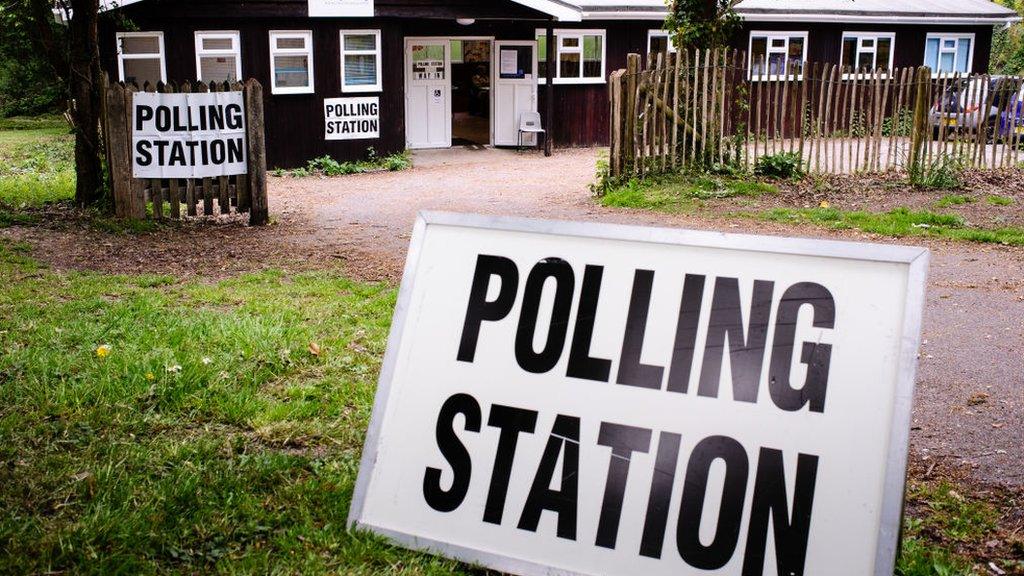What is a local election? And what happened?
- Published

Adults in England and Northern Ireland have been voting for who they want to represent them in their local area
Local elections give adults the chance to choose who represents them in their towns and councils - basically, at a more local level.
They took place yesterday in England and Northern Ireland, as adults went out to vote for their mayors and councillors. The voting stopped at 10pm last night.
The results are being reported today, with some still being counted.
They are showing that fewer people chose to vote for the big main political parties - Conservative and Labour. Instead, many picked candidates from smaller parties like the Liberal Democrats and the Green Party.
Experts are saying that this could because people are unhappy with how politicians are handling Brexit.
The Lib Dems have gained more than 300 councillors across the country and taken control of several councils. The Conservatives have lost over 400 seats and more than 15 councils, while Labour have also suffered losses.
Polls took place for 248 English councils and six mayors, and all 11 councils in Northern Ireland. A total of 8,400 seats were up for grabs in England and 462 seats were contested in Northern Ireland.
No local elections took place in Scotland or Wales.
Volunteers help to count people's votes
What is a local election?
Local elections give people the chance to choose the decision-makers who affect their communities.
There are several different types of local elections in the UK. That's because the way your local council is organised depends on where you live. (Read on to find out more about that.)
Some places in the UK have just one group of councillors who run all sorts of local services. In other areas, responsibilities are split between two or more 'layers' of councillors.
Local councillors are in charge of issues like bin collections, public transport, local education and environmental issues in the area.
Paper votes are counted and a winner is announced
When an adult votes in a local election, they will be given a ballot paper listing all the candidates standing to be a councillor in their area.
They might be asked to vote for more than one candidate, depending on where they live.
For example, in Scotland and Northern Ireland, voters are asked to rank the candidates in order of preference.
WATCH: How do people vote in an election?
How often do they happen?
Unlike politicians in the House of Commons who are voted for in a general election, a local council is often elected 'a bit at a time' rather than all in one go.
They take place at least every four years and are normally held on the first Thursday in May.
Your local government could do one of the following:
Elect all the local councillors every 4 years
Elect half the local councillors every 2 years
Elect one third of the local councillors every year for 3 years and hold no elections in the 4th year
Whenever adults go to the polls to vote in elections - whether local or general - many people often take their dogs and snap funny photos like this one!
Who can vote?
To vote in a local government election you must:
Be registered to vote
In most of the UK, be 18 years old or over on the day of the election - the age is 16 or over in Scotland
Be a British, Irish, Commonwealth or EU citizen
Be registered at an address in the area in which you want to vote
Not be legally excluded from voting - for example, convicted criminals in prison may not be able to vote, depending on their offence
Councillors can affect local services like the fire brigade
How does local government work?
Local government will be structured differently depending on where you live.
Some of the different types of local government in the UK include:
County council
District council
Borough council
Parish council
Town council
Unitary authority
Community council
Metropolitan borough
London borough
Directly elected mayors
If you live in London or in one of the big cities in England like Birmingham, Manchester, Leeds and Liverpool, you will have a London Borough or Metropolitan District Council. These councils provide all local services.
If you live in Scotland or Wales, you will have a unitary authority. There are also unitary authorities in some medium-sized towns and cities in England. These councils also provide all local services.
There are 11 local councils in Northern Ireland. These councils have a range of roles and responsibilities, including providing certain services and representation, from leisure and recreation to recycling and waste management.
Bin collection and recycling services are run by local councils
In some rural or semi-rural parts of England, local government is split between a county council and a district council. They look after things like education services, council tax, libraries, streets and roads, and bin collecting.
As well as local councils, the UK also has around 10,000 parish, town and community councils. They are responsible for looking after things like bus shelters, public toilets, bins, public parks and war memorials.
- Published27 October 2023
- Published28 February 2023
- Published23 October 2019
